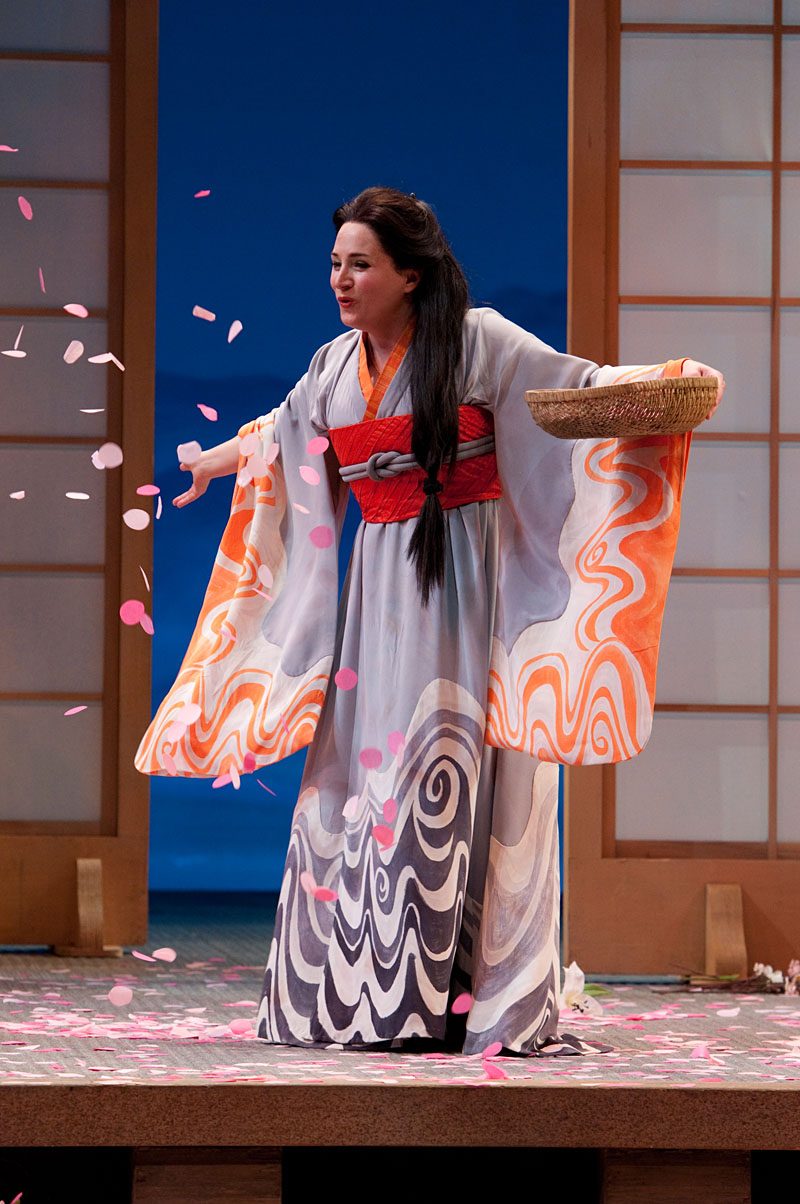Jumping on the opera-in-movie-theaters bandwagon, Seattle Opera decided charity begins at home, live-streaming Saturday’s McCaw Hall opening-night performance roughly a hundred yards west to KeyArena, where a crowd of just over 5,000 enjoyed it for free. The show was shrewdly chosen, a proven crowd-pleaser: Madama Butterfly, Puccini’s tragedy about a geisha seduced and abandoned by a naval officer.
Twenty minutes before conductor Julian Kovatchev’s downbeat, the buzz among the gathering Key crowd was giddier than even McCaw’s most-anticipated opening nights. The enormous screen, 50 by 80 feet, blocked off one end of the arena’s bowl. The opposite end was packed; the crowd thinned out along the sides and in several hundred more folding chairs covering the floor. As attendees laden with popcorn, nachos, and Kidd Valley bags found their seats, vendors strolled the aisles offering more munchies. (Not during the performance, fear not.) Bonus features onscreen and off included a tour of the SO costume shop; an interview with Patricia Racette, who sings the title role; a green-tea tasting; and a costume try-on station (who hasn’t always wanted to see himself in a turban?).
The picture, for its size, was of startling crispness. The sound quality offered clarity, picking up an impressive amount of orchestral detail, but lacked warmth, seeming to add a shrill edge to Racette’s soprano (or was it there to begin with?). The voice/pit balance picked up by the mikes, though not obtrusively artificial, favored the singers; my guess is they didn’t top the orchestra so robustly in McCaw. Simulcast director Frank Zamacona, a veteran of San Francisco Opera’s broadcasts to AT&T Park, made some intelligent choices: A close-up on Sarah Larsen, as Butterfly’s devoted maid Suzuki, overhearing Lt. Pinkerton admit his plan to eventually get a “real American wife,” pointed up a dramatic moment for KeyArena viewers that the live audience may have missed; a split screen, both sides featuring Jonathan Dean’s expert captions, captured the clashing points of view in the Act 3 trio.
As for the performance: I don’t envy any singer who has to try to make a character out of Pinkerton. What do you do with someone whose most salient personality trait is smug obliviousness? You live up to the audience’s expectations about Italian tenors and provide us with some vocal thrills. This Stefano Secco does, milking his ringing high notes and selling the heck out of the Act 1 love duet.
Racette, as they say, leaves it all on the dance floor, in a performance of intense commitment and heat. The role of Butterfly must convince on two levels: making us believe she’s a woman making herself believe Pinkerton will return. The fervor Racette throws into her signature aria, “Un bel dì,” is the heartbreaking desperation of a woman fighting to maintain the illusions that are her sole reason for living. Stage director Peter Kazaras’ masterstroke is the handling of her suicide, her final tableau (enhanced in KeyArena with a close-up) a sock in the gut.
Though the simulcast was a success in itself (I urge SO to offer one every season), everyone must be wondering about opera-at-the-Bijou’s potential long-term benefits to the company and to the art form in general. Will it provide the boost that supertitles, opera’s previous major innovation, did? Or will it become a replacement for, not an enhancement of, live opera? In a New York Times article just this past Sunday, Zachary Woolfe indulges in hand-wringing about the effects on regional opera companies of the Metropolitan Opera’s movie-theater broadcasts: the risk that audiences spoiled with close-ups and surround sound will be discouraged from attending live performances. “It is the undoing of opera,” Woolfe says; “a present, active audience is fundamental.” But he neglects to acknowledge the obvious: Opera productions have been broadcast on radio and TV for decades, and recorded, from vinyl platters to mp3s, for more than a century; if reproduction risked “undoing” live performance, it would have already.
Seattle Opera’s experiment did debunk one persistent myth. Ask classical pundits about the Death of Classical Music™, and they’ll claim that what keeps potential listeners away is the stultifying oppressiveness of concert-hall protocol. So you’d think that if any audience would have taken advantage of having the cold, dead hand of formality lifted, it’d have been the KeyArena throng—sitting in a sports palace, not a tuxedo in sight. Yet the riveted crowd was just as raptly silent as those paying customers over at McCaw (if not more so; we could hear their coughs loud and clear). Guess what? People listening to opera are quiet not because they’re cruelly forced to be, but because the music sounds better that way.







